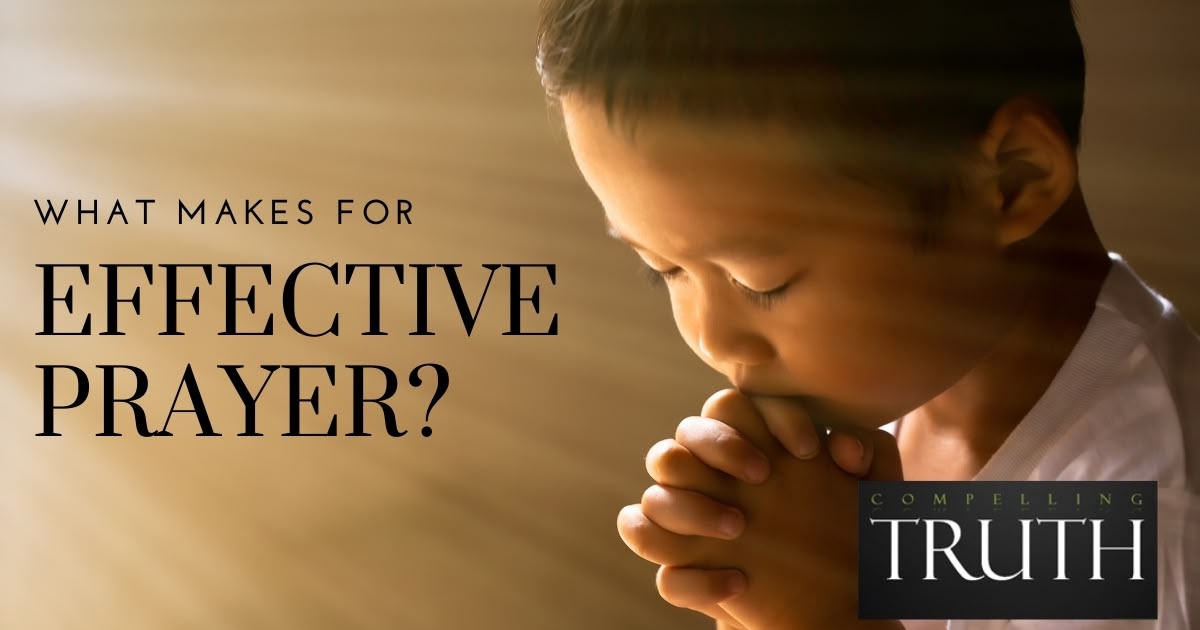Jesus told His followers, "And I tell you, ask, and it will be given to you; seek, and you will find; knock, and it will be opened to you" (Luke 11:9). Prayer is an incredible tool God has given us so that we may communicate personally and build an intimate relationship with Him. It empowers us to talk directly with God, worshiping His sovereignty, praising Him for His blessings, getting to know Him better, sharing our heart with Him, and asking Him to fulfill our desires and needs.
Prayer is a privilege granted to all who are children of God. But there are some things that can hinder our prayers. Here are some common hindrances to a healthy prayer life and steps you can take to overcome them.
Unconfessed Sin
Unconfessed sin can create a barrier between us and God in our prayer life (Isaiah 59:2). Our sin causes us to live according to our fleshly desires and not by the Spirit. When we accept Jesus Christ as our Savior we become a new creation and our sins are forgiven (2 Corinthians 5:17; Colossians 1:13–14; Ephesians 1:7). However, we still live in the world and in our human bodies; consequently, we will continue to be tempted and to sin. Although God has forgiven all of our sins from the past, present, and future, He still desires us to confess and repent from our sins as they happen (Jeremiah 31:34). First John 1:9 promises, "If we confess our sins, he is faithful and just to forgive us our sins and to cleanse us from all unrighteousness."
Selfish Motives
As humans we are very selfish and our prayer life is no exception. Often we pray solely for things that we want without regard to God's will or the needs of other people (James 4:1–4). While it is not bad to ask God for things we desire, we should always pray in God's will, following Jesus' example (1 John 5:14; Luke 22:42). With this mindset we will begin to understand the bigger picture of what God is doing in the world and how our individual lives are a part of that plan. In addition, it will help us to submit in obedience to His will. We should also make a habit of praying for others (Philippians 2:3–4). This will help transform our hearts to focus on caring for and reaching out to other people.
Unforgiveness
In Matthew 6:14–15 Jesus says, "For if you forgive others their trespasses, your heavenly Father will also forgive you, but if you do not forgive others their trespasses, neither will your Father forgive your trespasses." A few chapters later Jesus tells the parable of the unmerciful servant (Matthew 18:21–35). In this parable a master forgives his servant's substantial debt instead of selling him. Then the servant refuses to forgive his fellow servant a far lesser debt and has him thrown into prison. The master hears of this and says, "'…should not you have had mercy on your fellow servant, as I had mercy on you?' And in anger his master delivered him to the jailers, until he should pay all his debt" (Matthew 18:33–34). Jesus said God would do the same. We cannot expect God to answer our prayers, particularly for relational forgiveness, if we ourselves are not willing to forgive. By forgiving others, and also forgiving ourselves, for wrongdoings we allow God to be the Judge.
Unbelief
Doubt in God's ability to answer our prayers is a hindrance (James 1:6–7). Prayer requires faith. When we pray we are acknowledging God is capable of answering our prayer, yet at the same time submitting to God's will and understanding that He may or may not choose to answer the prayer the way we want Him to. Nonetheless, we should pray believing that God can and will answer according to His will. A great example of such faith is demonstrated by the Roman centurion who believed Jesus could heal his servant simply with His word and without having to come into his house (Matthew 8:8).
Marital Conflict
Paul tells us that conflict in a marriage can impede our prayer life. This is due to a lack of obedience in how we should act towards one another. He encourages husbands and wives to love and respect one another in obedience to God so that they can have a healthy prayer life (1 Peter 3:7; Ephesians 5:22–24).
Idols
When we make other gods or things a priority in our life before God it interferes with our prayer life (Ezekiel 14:3). It clearly states in the Ten Commandments, "You shall have no other gods before me" (Exodus 20:3). Each time the Israelites chose to worship other gods, God chose to not listen to their prayers until they repented. Consequently they spent forty years wandering the desert before entering the Promised Land and were later exiled from the Promised Land. When they repented, however, He once again answered their prayers and restored their nation.
Spiritual Warfare
One hindrance to prayer that is not a result of our sinful nature is spiritual warfare. The Devil knows that he has lost the war for our soul once we become believers, but he will do whatever he can to keep us from living the life God desires for us. Daniel faced a lot of spiritual warfare when God was speaking to him about the end times. Nonetheless, Daniel continued in prayer and fasted until he heard from God again (Daniel 10). Persistence, fasting, praying in the spirit, and praying in community are all ways to pray effectively in the midst of spiritual warfare.
Prayer is a privilege granted to all who are children of God. But there are some things that can hinder our prayers. Here are some common hindrances to a healthy prayer life and steps you can take to overcome them.
Unconfessed Sin
Unconfessed sin can create a barrier between us and God in our prayer life (Isaiah 59:2). Our sin causes us to live according to our fleshly desires and not by the Spirit. When we accept Jesus Christ as our Savior we become a new creation and our sins are forgiven (2 Corinthians 5:17; Colossians 1:13–14; Ephesians 1:7). However, we still live in the world and in our human bodies; consequently, we will continue to be tempted and to sin. Although God has forgiven all of our sins from the past, present, and future, He still desires us to confess and repent from our sins as they happen (Jeremiah 31:34). First John 1:9 promises, "If we confess our sins, he is faithful and just to forgive us our sins and to cleanse us from all unrighteousness."
Selfish Motives
As humans we are very selfish and our prayer life is no exception. Often we pray solely for things that we want without regard to God's will or the needs of other people (James 4:1–4). While it is not bad to ask God for things we desire, we should always pray in God's will, following Jesus' example (1 John 5:14; Luke 22:42). With this mindset we will begin to understand the bigger picture of what God is doing in the world and how our individual lives are a part of that plan. In addition, it will help us to submit in obedience to His will. We should also make a habit of praying for others (Philippians 2:3–4). This will help transform our hearts to focus on caring for and reaching out to other people.
Unforgiveness
In Matthew 6:14–15 Jesus says, "For if you forgive others their trespasses, your heavenly Father will also forgive you, but if you do not forgive others their trespasses, neither will your Father forgive your trespasses." A few chapters later Jesus tells the parable of the unmerciful servant (Matthew 18:21–35). In this parable a master forgives his servant's substantial debt instead of selling him. Then the servant refuses to forgive his fellow servant a far lesser debt and has him thrown into prison. The master hears of this and says, "'…should not you have had mercy on your fellow servant, as I had mercy on you?' And in anger his master delivered him to the jailers, until he should pay all his debt" (Matthew 18:33–34). Jesus said God would do the same. We cannot expect God to answer our prayers, particularly for relational forgiveness, if we ourselves are not willing to forgive. By forgiving others, and also forgiving ourselves, for wrongdoings we allow God to be the Judge.
Unbelief
Doubt in God's ability to answer our prayers is a hindrance (James 1:6–7). Prayer requires faith. When we pray we are acknowledging God is capable of answering our prayer, yet at the same time submitting to God's will and understanding that He may or may not choose to answer the prayer the way we want Him to. Nonetheless, we should pray believing that God can and will answer according to His will. A great example of such faith is demonstrated by the Roman centurion who believed Jesus could heal his servant simply with His word and without having to come into his house (Matthew 8:8).
Marital Conflict
Paul tells us that conflict in a marriage can impede our prayer life. This is due to a lack of obedience in how we should act towards one another. He encourages husbands and wives to love and respect one another in obedience to God so that they can have a healthy prayer life (1 Peter 3:7; Ephesians 5:22–24).
Idols
When we make other gods or things a priority in our life before God it interferes with our prayer life (Ezekiel 14:3). It clearly states in the Ten Commandments, "You shall have no other gods before me" (Exodus 20:3). Each time the Israelites chose to worship other gods, God chose to not listen to their prayers until they repented. Consequently they spent forty years wandering the desert before entering the Promised Land and were later exiled from the Promised Land. When they repented, however, He once again answered their prayers and restored their nation.
Spiritual Warfare
One hindrance to prayer that is not a result of our sinful nature is spiritual warfare. The Devil knows that he has lost the war for our soul once we become believers, but he will do whatever he can to keep us from living the life God desires for us. Daniel faced a lot of spiritual warfare when God was speaking to him about the end times. Nonetheless, Daniel continued in prayer and fasted until he heard from God again (Daniel 10). Persistence, fasting, praying in the spirit, and praying in community are all ways to pray effectively in the midst of spiritual warfare.



